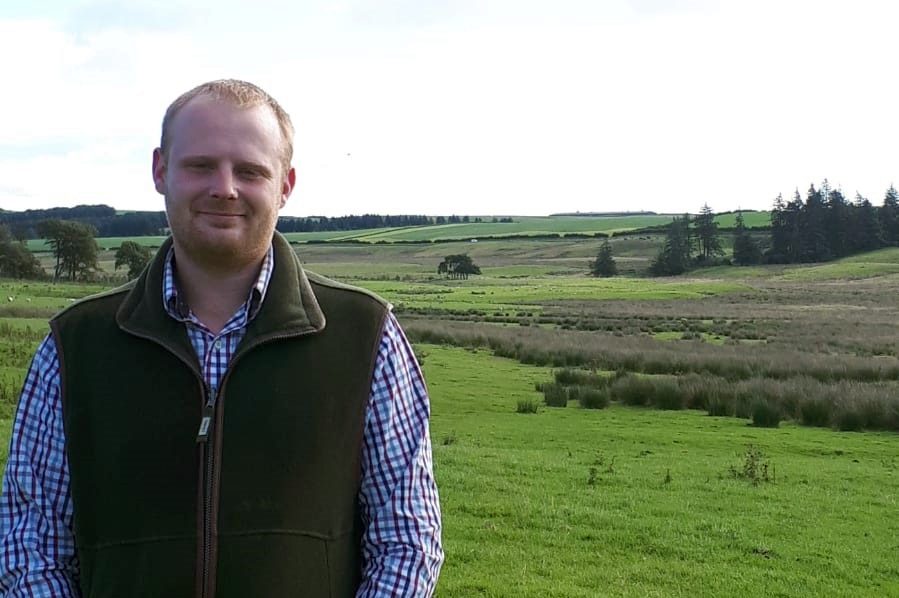
An on-farm experiment with Border Leicesters has delivered substantial commercial results for Scottish young farmer's business.
Robbie Pittendrigh has developed the breed to be his primary commercial sire to produce replacement ewe lambs and lambs, that average 19 - 22kg, for the deadweight market.
Once the mainstay of the Scottish sheep industry, the 27-year-old says that this dual-purpose breed has allowed the enterprise to expand and diversify, capitalising on the Border Leicester’s key breed strengths.
“I feel they are very versatile. The Border excels at producing prime lambs on a low input system, this is especially important during current times with rising input costs. It has been one of the best decisions I have made.”
Known in the sheep industry as the ‘great improver’, the Border Leicester is the crossing sire for producing profitable, commercial, breeding stock.
Often crossed with hill breeds to produce a half-bred lamb, the breed is known for their hybrid vigour, strong maternal qualities, and the ability to produce early maturing lambs.
Located in the foothills of the Pentland Hills in Peeblesshire, the Pittendrigh family farms sheep and beef on their 243-hectare rented Blaircochrane Farm.
“We didn’t originally farm Borders in Northumberland, but acquired two before moving to Scotland, as we fancied a change from their more numerous Bluefaced cousins.
"What started as an experiment went very well and resulted in increasing the numbers, and the breeds, we are putting them too,” said Robbie.
The farm runs eleven Border Leicester rams across 300 Scotch Blackface ewes, 300 Lleyns, with a further 100 cross ewes, mainly mule and Cheviot mules, crossed with a terminal sire and sold through Dunbia Abattoir.
The Scotch Blackface’s are currently averaging 1.3 lambs and are crossed with the Borders to produce Greyface lambs.
Robbie added: “We made the move to Borders to improve hardiness into the ewes and an easy fleshing frame.
"We needed something that could lamb easily and withstand the climate, without having to be pampered and looked after all the time.”
The farm is based on an all outdoor lambing system, with sheep managed on a grass and kale-based diet, with food and mineral blocks introduced at key times of the year, depending on conditions and pregnancy scanning results.
“A percentage of our Border ewe lambs are kept on the farm as replacements. They are proving to be great mothers and able to maintain themselves and their lambs on a forage diet, with minimal supplementation.”
Looking ahead, the family plan to sell their Lleyn cross Border ewe lambs and increase the number of Scotch Blackfaces being put their Border sire. The majority of fat lambs will continue to be sold deadweight.
“The next step is to buy more Border females and produce our own tups. Our aim will continue to be producing our own ewes and, as a result, rear a strong animal that will survive well and produce lambs that will have size and hardiness from the start.”
According to Robbie, it is all about finding what suits individual farms best: “Borders have blended in perfectly with us and we will definitely be increasing our numbers in the future.”
President of the Border Leicester Sheep Society, Pete Brown said it was encouraging to see a young person getting passionately involved with the breed.
"Robbie has been exploring a number of crossbreeding approaches to see what suits his farm’s weather and terrain, as well as how the breed can open both meat and progeny sale markets for him.
“The Border Leicester’s attributes are wide-ranging and very suitable to today’s flocks. They produce a high performing breeding ewe that has excellent maternal characteristics, producing early maturing lambs.
“Their easy nature means they are suitable for farms of all sizes. Crossing on to hill breeds like Robbie is doing, gives not only a valuable replacement ewe lamb, but quality wether lambs too.”
